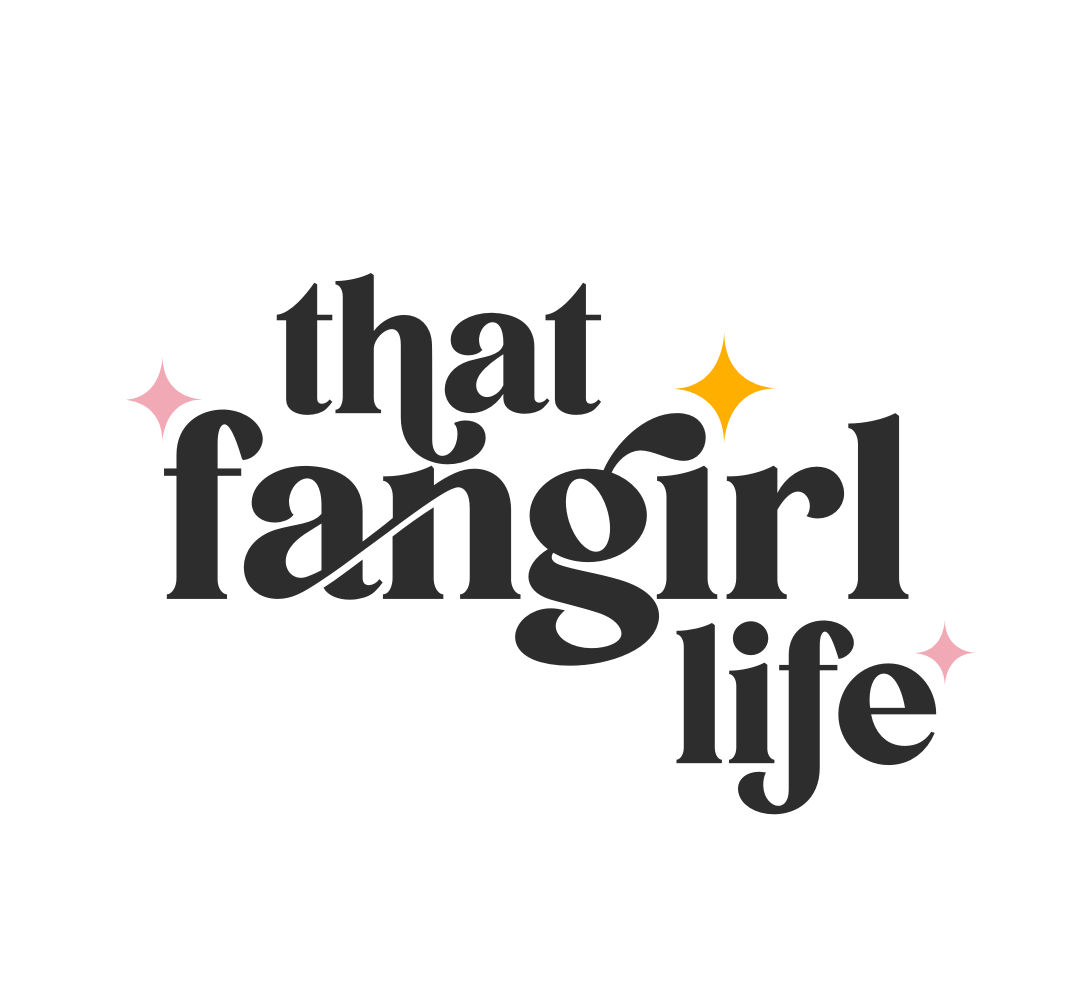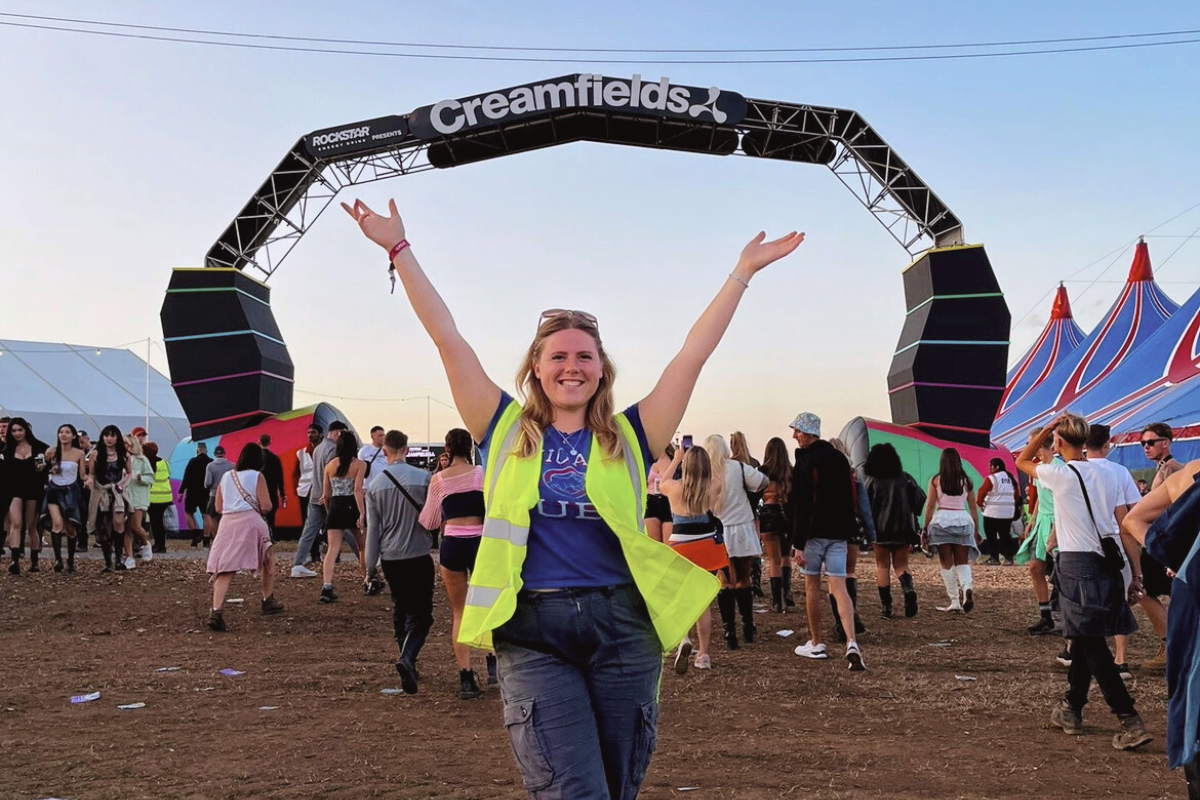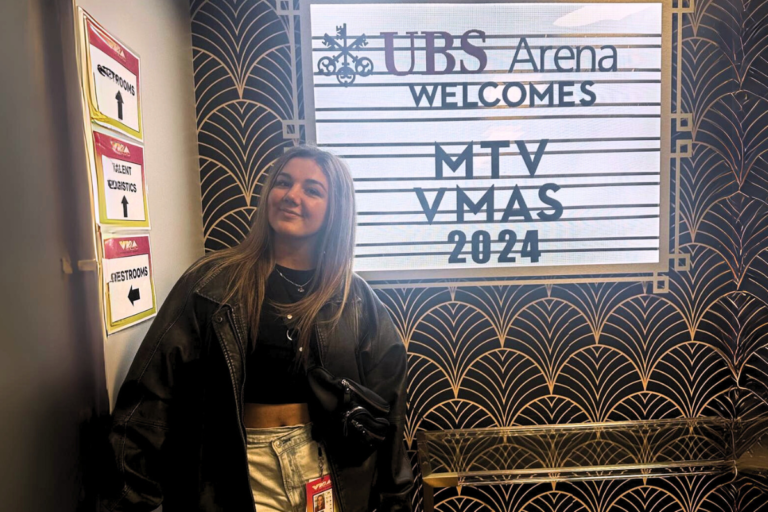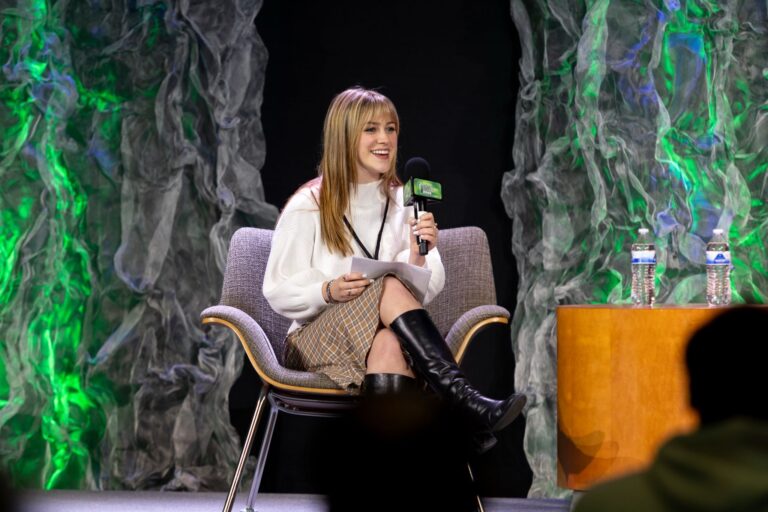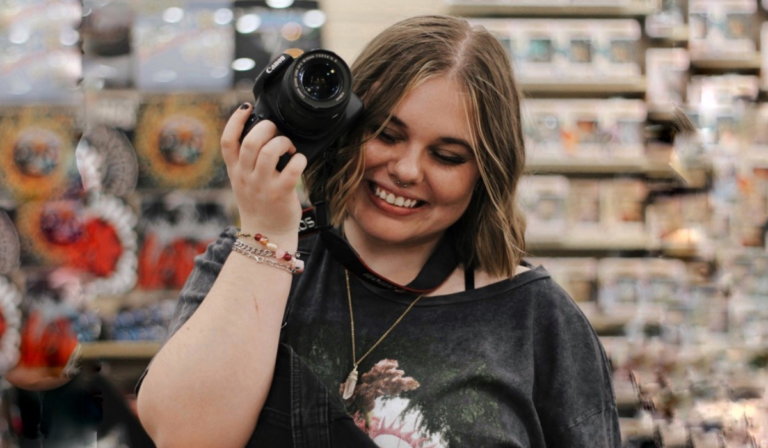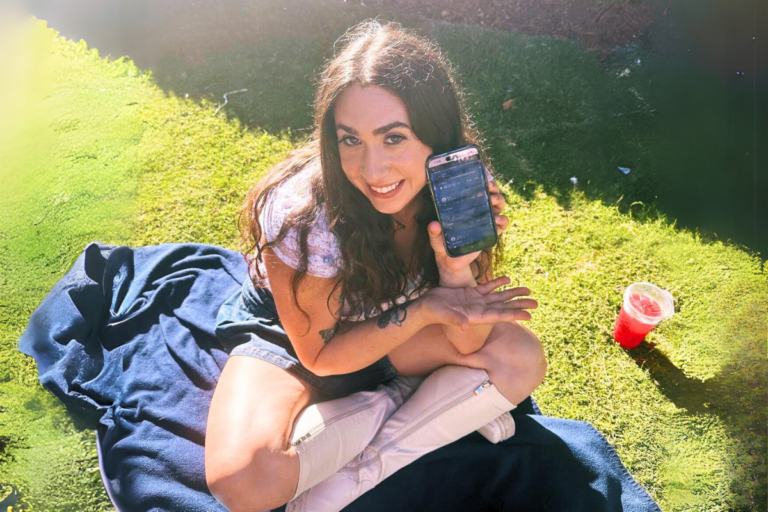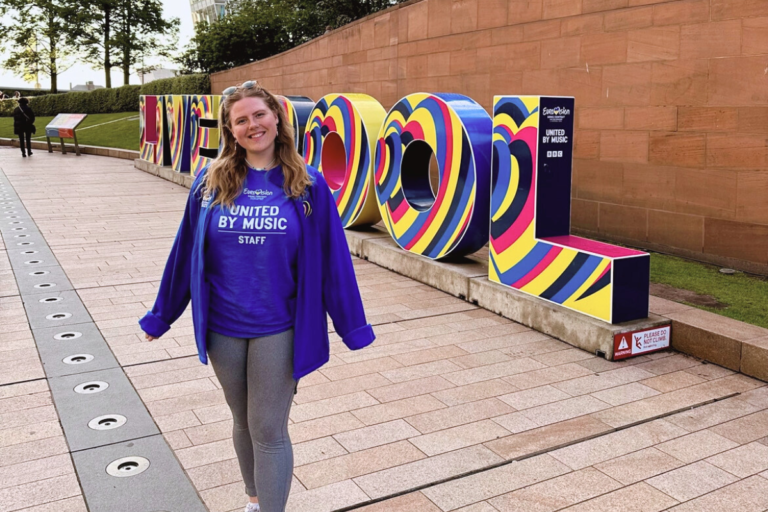Small Town Girl to Big Events World: Molly Rees’ Story
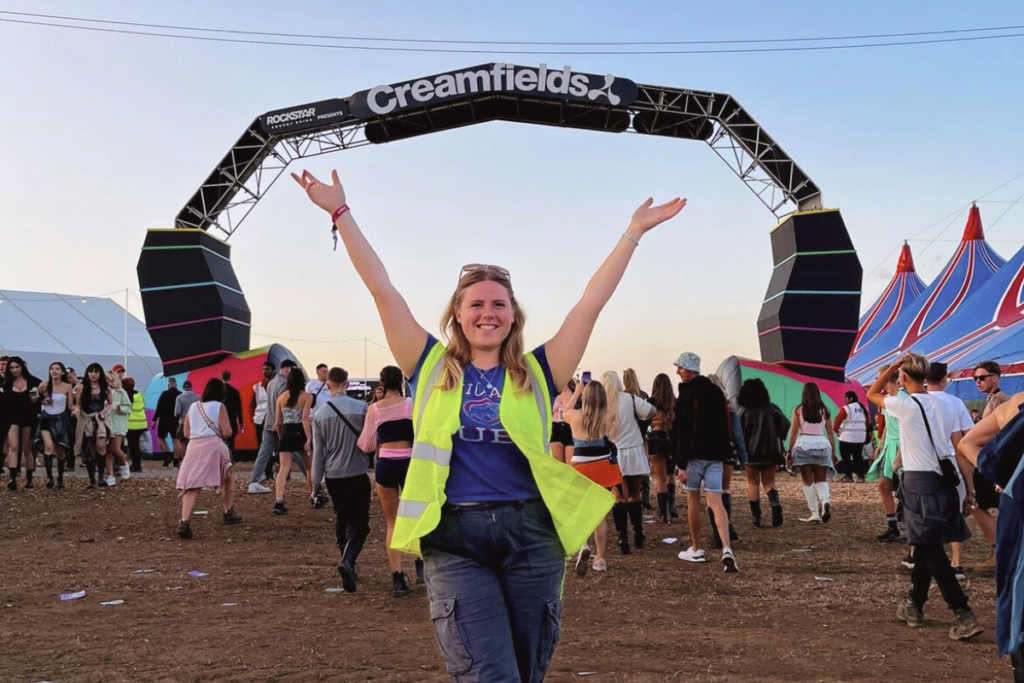
Molly Rees’ journey into the world of live events management began with a spark ignited in her childhood.
Raised in a small Northern Irish town, opportunities on the global stage didn’t exactly come knocking on Molly’s door. Instead of waiting for them to arrive – which may, of course, have been easier – she took herself to them, banging on every single one until one eventually opened. From there, she never looked back.
Fresh off the back of a summer of freelancing, we caught up with Molly to talk all about what it’s been like to work across some of the biggest shows and events the UK has seen: from Taylor Swift to Coldplay, Harry Styles to Creamfields.
How did you get into major events management?
Whether I have realised it or not, events have run through me like a current since I was little, my most prestigious event at the time being the ‘Easter Olympics 2010’ which took place in my back garden. I invited over all my primary school friends and with careful planning, precision and a shop at Poundland I created the event of the year! With a full run sheet for the day, lots of games, a medal ceremony and lots of sugar-doped children – the event was a complete success. Since then, when anybody ever asked me what I wanted to do when I grew up I would answer “I don’t know, all I know is I want to be running around.” When it came to completing my UCAS application, I found this a really challenging time.
I debated on taking a gap year as I felt so lost in what I wanted to do. I grew up in a small town with creative and inspirational people, but exposure and resources were limited.
I told my mum about my worries, and she said, “You know what you want to do? Do what you have always done – event management!” And she was right – I hadn’t even considered this. It felt like all the different fragmented pieces of my life connected into one big puzzle: The Easter Olympics, organising my school formal, and working on a range of cultural events in my town such as The Enniskillen International Beckett Festival. Of course, it was event management, how had I not thought of this! Then providentially, I was doing a research project for one of my A-Levels and discovered the Liverpool Institute for Performing Arts (LIPA). It felt like the course was written for me.
What was it like studying at LIPA?
When I started university, on the first day we sat down in our new lecture halls and our head of course stood up and said something that would change the trajectory of the next 3 years.
“Look to your left, look to your right. These people sitting next to you will either be your employer or your employee. You decide which.”
That one sentence changed how I thought about not only this industry but my peers. Every day was real-life networking at university, expanding connections, making friends and working together to achieve something greater. It instilled in me the fact that no matter who I worked with, they were people and being kind and working together was essential. LIPA was like a real-life industry playground, a place to practice before heading out into the real world.
The modules were shaped and taught by professionals who had lived and worked in this industry for many years. Like many students doing excessive coursework, you and your friends will complain and sigh and say things like “What is the point? Why are we even doing this?’ It all became very apparent when I left LIPA that many things I learnt through my modules and projects were an almost exact replica of real life. I have lost count of the number of times I have said, “Oh we did this in uni” whilst at work and smiling to myself almost hearing my lecturers’ voices saying, “I told you this would be useful”.
If you are still at university my advice is to throw yourself into every module and project as you never know what you may learn or what will be useful down the line.
Whilst at LIPA I got to take on lots of incredible opportunities such as working for Ticketmaster as a Box Office Assistant and Lane Supervisor, enabling me to work on events such as Coldplay, Taylor Swift, Harry Styles and Creamfields Festival. Going from only having seen a few concerts in Belfast until the age of 19 to then working on approximately 70 stadium/festival gigs felt like an incredible accomplishment.
During my studies at LIPA, I knew I had to take every opportunity that was presented and also create my own. I worked extremely hard to prove my place there, however, I still felt lost. The majority of my peers wanted to go into the music business to be A&Rs or Artist Managers and as interesting as I found it, I just knew it wasn’t for me.
The Epiphany
A defining point in my life happened in my second year when we had to organise our final-year placements; all my peers knew exactly what they wanted to do and I didn’t. Then Head of Events for Culture Liverpool, Sue Gibson did a presentation on major event planning and all I could think was “I want to do what she does!” So nervously, I went up to Sue Gibson, and in a rush said “You have literally given me the biggest epiphany, I want to be you, can I please have your email to chat about a placement?” And then the door opened and I walked right through it… leading to me working with a team of the most inspiring, knowledgeable and creative women in Culture Liverpool where I thrived. I was a sponge and absorbed everything around me. I wanted to be a part of every meeting, listen to conversations to pick up vocabulary, and be involved in every bit of research and project available.
So, my number one tip is you’re not being annoying, just ask! I consistently asked for things to do on placement, connected personally with others getting to know them, and added my own spark to the work I was set. Actively engaging with your team, being positive and energetic and showing a genuine interest are essential to forming good relationships and to stand out.
Because of my initiative, enthusiasm and hard work, I was put forward for more projects. Whilst on placement I was given the opportunity to work on the World Gymnastics Championships 2022. As a past gymnast, this was a dream come true! I worked as an Accreditation Assistant working with the spectator services team to help develop sensory games for the sensory packs, pack medals and collate an information sheet based on spectator travel plans. Immersing yourself in every aspect of the event was essential to learn and get a good grounding in all aspects of operational delivery.
This is where I really got a taste for major events. It was my first experience of something this size and being on the ground delivering it. The intensity, fast pace, problem-solving and teamwork lit a fire in me, and I knew I was going to keep chasing that spark.
My drive and enthusiasm paid off, and after my 3-month placement, I was employed as an Events Assistant with Culture Liverpool whilst simultaneously finishing my uni course. This enhanced my experience and CV, working on a diverse range of events from the Liverpool International Music Festival Conference as an Artist Liaison, Chinese New Year and then (with much excitement and a dose of imposter syndrome) I got to work on Eurovision 2023!
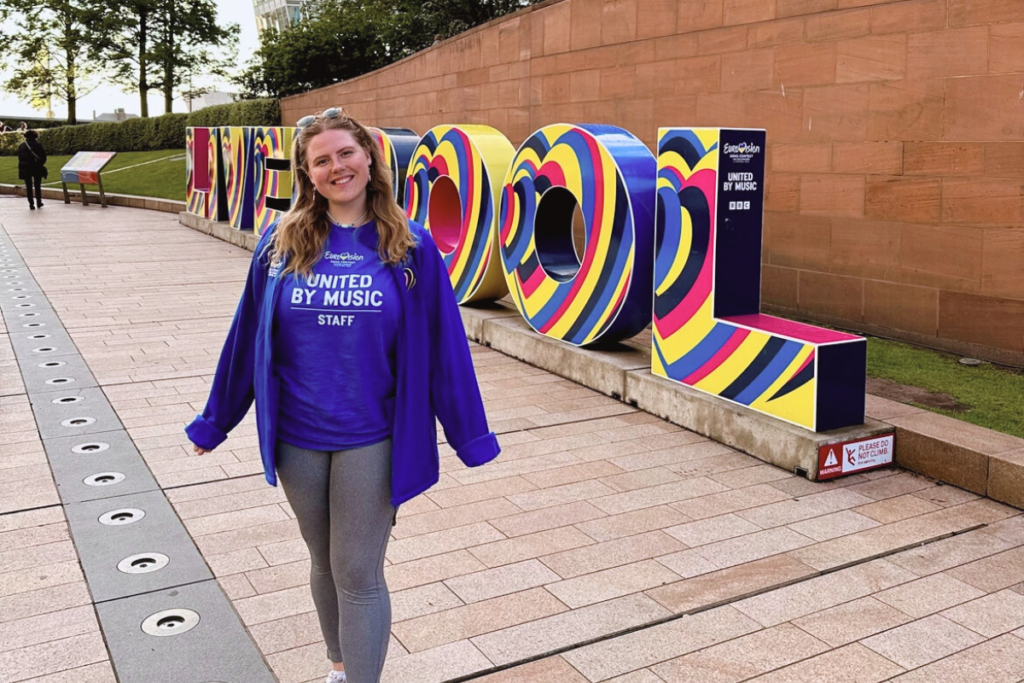
What was it like to work on Eurovision?
Eurovision to this day is still the event that has impacted me the most. Whilst working with Culture Liverpool to deliver the Host City elements of Eurovision, I became the Concessions Manager. This involved coordinating and securing all traders and concessions that would make up the Fan Village and Opening Ceremonies. I felt privileged to be trusted with this task which gave me trust in myself to deliver it. The women in this industry and that team have inspired me ever since. They’re what propelled and drove me forward and they always will. The atmosphere in the Fan Village was electric, full of love, safe and unifying.
The feeling of looking out onto the crowd in the Fan Village knowing I had been a part of the events team to deliver that is a feeling that drives me today. It is that common phenomenon that event professionals go through, all the stressful, intense, busy months in the planning phase and then you have a moment during delivery where you feel euphoric, a ‘this is what it’s for’ moment and just like that, you forget about the past few months of blood, sweat and tears. That is why we do it and keep doing it.
How did networking contribute to your career development in major events?
I cannot over-emphasise the importance of networking. As a people person, I love meeting and chatting with new people, and I find the formal idea of purposely networking a bit of an alien concept. Little did I know that a brief chat World Gymnastics Championships Chief Operating Officer would lead me to my first job post-graduation at the World Athletics Indoor Championships Glasgow 24 (WIC24).
Relocating to Glasgow, meeting a new team and beginning a new job were all new challenges and opportunities in themselves. Within this role I used the same tactics I had in my placement, I consistently asked different functional area managers if they needed help or assistance. Within this role, I worked directly under the Championship Director. The senior management team began to trust me and delegated more senior responsibilities to me.
I really enjoyed working alongside the Protocol manager to coordinate events such as the Civic Welcome Reception and the Partners’ Dinner and managing all client and federation site visits. I also assisted in City Activation and Spectator Experience. My role was always going to be varied but I also believe I went above and beyond the job description. I absorbed all I could from the professionals around me, taking advantage of this incredible opportunity to experience and be a part of all aspects that are required to put together a Major World Championship.
In what ways has growing up in a small town shaped your career?
It’s a funny feeling when you are part of a team planning an event when the capacity is greater than the population of your hometown, and an even funnier feeling when the amount of people watching that event on TV is a greater population than your whole country. Being from a small border town in Northern Ireland you may think “There must be nothing going on” and yes, maybe that’s true to the naked eye.
But if you dig a bit deeper and talk to the right people you will unlock a great amount of cultural heritage, art, poetry, extremely talented professionals and a passion that is lit by a fire of “How can I help?”, “How can I get involved?”, and an astounding sense of community. Growing up here, it may seem unclear how it shaped me and my career so far but to be honest, this community, this village is the reason I am who I am. Not only because of my incredible support network but the intrinsic values my small town instilled in me.
The transferable qualities and skills I have gained such as problem-solving, creating something out of nothing, seeing creative potential in a blank wall or a farm field and always asking, “How can I help?”. The subtleties of the things I do within my teams or through my career are those of the values that my community has taught me. My small town inspires me, and my village motivates me. These are the people who footnote my career, and I will forever appreciate their vital role in my story.
